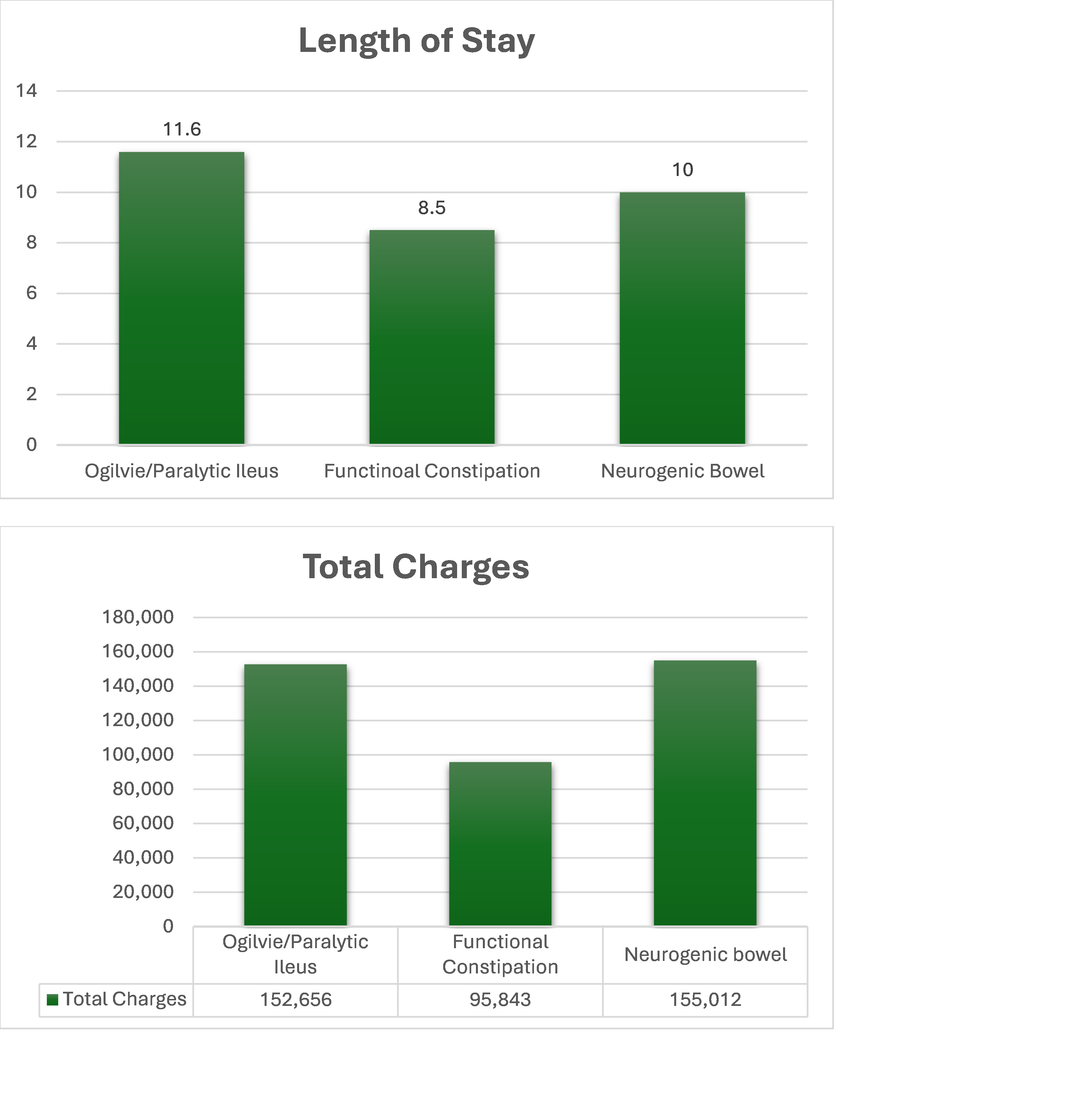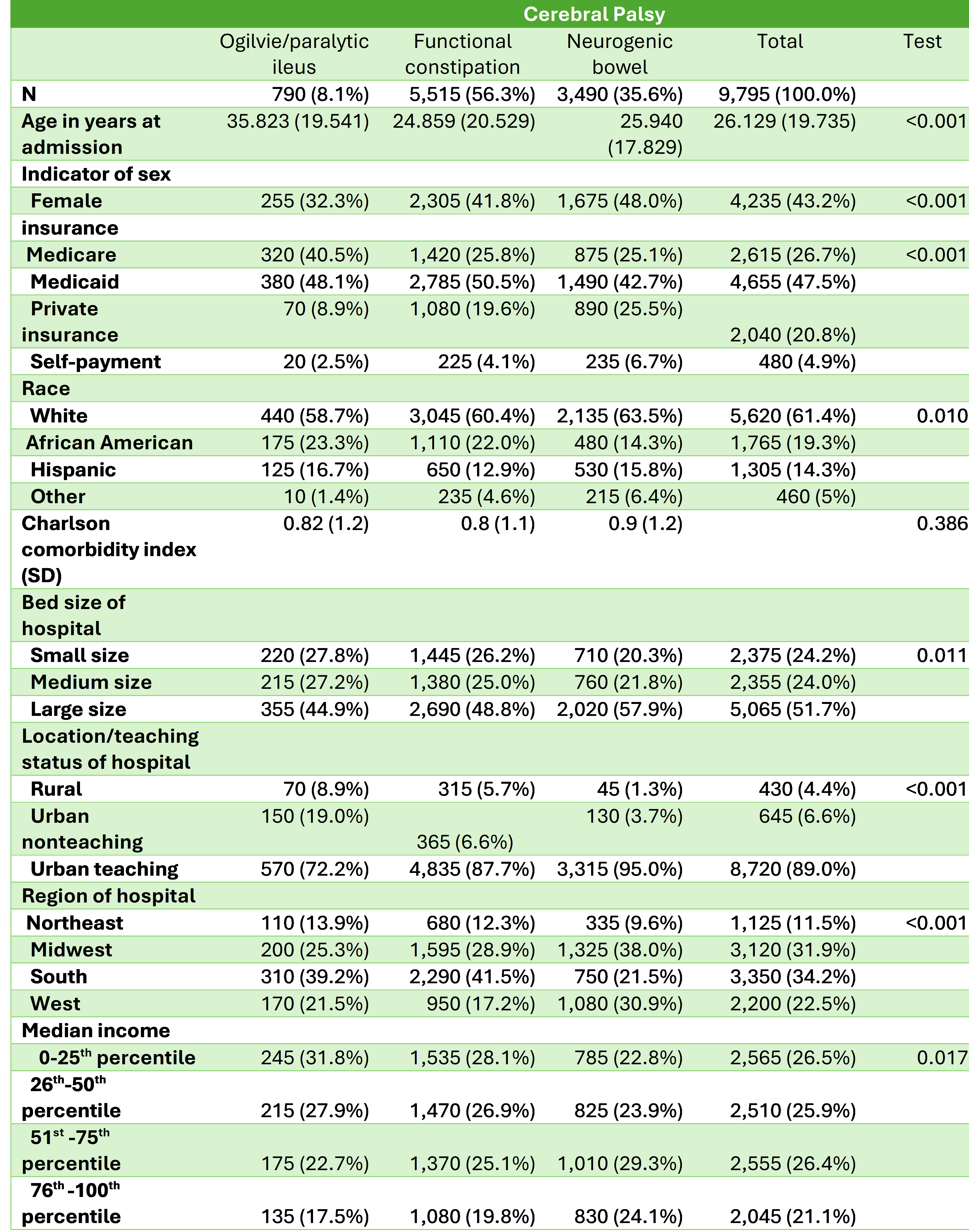Monday Poster Session
Category: Functional Bowel Disease
P2925 - Prevalence, Clinical Characteristics, and Healthcare Outcomes of Non-Obstructive Constipation Subtypes in Patients With Cerebral Palsy: A Nationwide Inpatient Analysis
Monday, October 27, 2025
10:30 AM - 4:00 PM PDT
Location: Exhibit Hall

Bassel Dakkak, MD
Marshall University Joan C. Edwards School of Medicine
Huntington, WV
Presenting Author(s)
Bassel Dakkak, MD1, Tejas Joshi, MD1, Leen Kayali, MD1, Mohamed L. Hammad, MD1, Elizabeth Harris, MD1, Lauren Searls, DO1, Abdelwahap Elghezewi, MD2, Wesam Frandah, MD1, Ahmed Sherif, MD1
1Marshall University Joan C. Edwards School of Medicine, Huntington, WV; 2Marshall University Joan C. Edwards School of Medicine, Barboursville, WV
Introduction: Patients with neurological disorders, such as cerebral palsy (CP), face an increased risk of gastrointestinal dysfunction, particularly constipation. Despite its clinical impact, limited data exist comparing constipation subtypes in this population. This study evaluates the prevalence and outcomes, including mortality, length of stay (LOS), and hospital charges, across three constipation subtypes: Ogilvie/paralytic ileus, functional constipation, and neurogenic bowel, in CP patients.
Methods: Using the National Inpatient Sample (NIS) from 2018-2021, we identified CP patients with constipation using ICD-10-CM codes. Constipation was categorized into Ogilvie/paralytic ileus, functional constipation, and neurogenic bowel. T-test and chi-square test compared patient and hospital characteristics, while regression models assessed outcomes. Survey weights were applied to account for NIS's complex sampling design.
Results: CP represented 367,785 hospitalizations; 9,795 had non-obstructive constipation. Functional constipation was the most common subtype (56.3%), followed by Ogilvie/paralytic ileus (35.6%) and neurogenic bowel (8.1%). CP patients with constipation were more likely to be White (61.4%), male (56.8%), on Medicaid (47.5%), and treated at large urban teaching hospitals (89.0%) (Table 1).
Functional constipation had lower odds of in-hospital mortality (OR: 0.26, p=0.003) compared to patients without constipation, while Ogilvie/paralytic ileus and neurogenic bowel had no significant impact on mortality. However, LOS increased with Ogilvie/paralytic ileus (β: +4.5, p< 0.001), neurogenic bowel (β: +3.3, p< 0.001), and functional constipation (β: +1.7, p< 0.001). Hospital charges were only higher in Ogilvie/paralytic ileus (β: +$59,992, p< 0.001), and neurogenic bowel (β: +$63,760, p< 0.001) groups (Figure 1).
Discussion: Non-obstructive constipation poses a significant burden for CP patients, with certain subtypes leading to prolonged LOS and higher costs. Early identification and interventions, such as dietary counseling and pelvic floor rehabilitation, may improve outcomes. Incorporating these strategies can reduce healthcare utilization and improve overall well-being for these patients. On the other hand, the observed reduction in mortality among CP patients with functional constipation may reflect increased healthcare engagement or a less severe disease profile compared to other subtypes. Further studies are warranted to explore these associations. AI was used to refine language only.

Figure: Table 1. Demographic and Hospital Characteristics of Cerebral Palsy Patients by Subtype of Non-Obstructive Constipation.

Figure: Figure 1. Length of Stay and Total Hospital Charges by Subtype of Non-Obstructive Constipation in Patients with Cerebral Palsy.
The top panel shows mean length of stay (LOS) in days, and the bottom panel shows mean total hospital charges (USD) for each constipation subtype.
Disclosures:
Bassel Dakkak indicated no relevant financial relationships.
Tejas Joshi: Salix, Gilead, Echosens – Advisor or Review Panel Member, Consultant, Grant/Research Support.
Leen Kayali indicated no relevant financial relationships.
Mohamed Hammad indicated no relevant financial relationships.
Elizabeth Harris indicated no relevant financial relationships.
Lauren Searls indicated no relevant financial relationships.
Abdelwahap Elghezewi indicated no relevant financial relationships.
Wesam Frandah: Boston Scientific – Advisor or Review Panel Member, Consultant. Merritt – Consultant. Olympus corporation of America – Consultant.
Ahmed Sherif indicated no relevant financial relationships.
Bassel Dakkak, MD1, Tejas Joshi, MD1, Leen Kayali, MD1, Mohamed L. Hammad, MD1, Elizabeth Harris, MD1, Lauren Searls, DO1, Abdelwahap Elghezewi, MD2, Wesam Frandah, MD1, Ahmed Sherif, MD1. P2925 - Prevalence, Clinical Characteristics, and Healthcare Outcomes of Non-Obstructive Constipation Subtypes in Patients With Cerebral Palsy: A Nationwide Inpatient Analysis, ACG 2025 Annual Scientific Meeting Abstracts. Phoenix, AZ: American College of Gastroenterology.
1Marshall University Joan C. Edwards School of Medicine, Huntington, WV; 2Marshall University Joan C. Edwards School of Medicine, Barboursville, WV
Introduction: Patients with neurological disorders, such as cerebral palsy (CP), face an increased risk of gastrointestinal dysfunction, particularly constipation. Despite its clinical impact, limited data exist comparing constipation subtypes in this population. This study evaluates the prevalence and outcomes, including mortality, length of stay (LOS), and hospital charges, across three constipation subtypes: Ogilvie/paralytic ileus, functional constipation, and neurogenic bowel, in CP patients.
Methods: Using the National Inpatient Sample (NIS) from 2018-2021, we identified CP patients with constipation using ICD-10-CM codes. Constipation was categorized into Ogilvie/paralytic ileus, functional constipation, and neurogenic bowel. T-test and chi-square test compared patient and hospital characteristics, while regression models assessed outcomes. Survey weights were applied to account for NIS's complex sampling design.
Results: CP represented 367,785 hospitalizations; 9,795 had non-obstructive constipation. Functional constipation was the most common subtype (56.3%), followed by Ogilvie/paralytic ileus (35.6%) and neurogenic bowel (8.1%). CP patients with constipation were more likely to be White (61.4%), male (56.8%), on Medicaid (47.5%), and treated at large urban teaching hospitals (89.0%) (Table 1).
Functional constipation had lower odds of in-hospital mortality (OR: 0.26, p=0.003) compared to patients without constipation, while Ogilvie/paralytic ileus and neurogenic bowel had no significant impact on mortality. However, LOS increased with Ogilvie/paralytic ileus (β: +4.5, p< 0.001), neurogenic bowel (β: +3.3, p< 0.001), and functional constipation (β: +1.7, p< 0.001). Hospital charges were only higher in Ogilvie/paralytic ileus (β: +$59,992, p< 0.001), and neurogenic bowel (β: +$63,760, p< 0.001) groups (Figure 1).
Discussion: Non-obstructive constipation poses a significant burden for CP patients, with certain subtypes leading to prolonged LOS and higher costs. Early identification and interventions, such as dietary counseling and pelvic floor rehabilitation, may improve outcomes. Incorporating these strategies can reduce healthcare utilization and improve overall well-being for these patients. On the other hand, the observed reduction in mortality among CP patients with functional constipation may reflect increased healthcare engagement or a less severe disease profile compared to other subtypes. Further studies are warranted to explore these associations. AI was used to refine language only.

Figure: Table 1. Demographic and Hospital Characteristics of Cerebral Palsy Patients by Subtype of Non-Obstructive Constipation.

Figure: Figure 1. Length of Stay and Total Hospital Charges by Subtype of Non-Obstructive Constipation in Patients with Cerebral Palsy.
The top panel shows mean length of stay (LOS) in days, and the bottom panel shows mean total hospital charges (USD) for each constipation subtype.
Disclosures:
Bassel Dakkak indicated no relevant financial relationships.
Tejas Joshi: Salix, Gilead, Echosens – Advisor or Review Panel Member, Consultant, Grant/Research Support.
Leen Kayali indicated no relevant financial relationships.
Mohamed Hammad indicated no relevant financial relationships.
Elizabeth Harris indicated no relevant financial relationships.
Lauren Searls indicated no relevant financial relationships.
Abdelwahap Elghezewi indicated no relevant financial relationships.
Wesam Frandah: Boston Scientific – Advisor or Review Panel Member, Consultant. Merritt – Consultant. Olympus corporation of America – Consultant.
Ahmed Sherif indicated no relevant financial relationships.
Bassel Dakkak, MD1, Tejas Joshi, MD1, Leen Kayali, MD1, Mohamed L. Hammad, MD1, Elizabeth Harris, MD1, Lauren Searls, DO1, Abdelwahap Elghezewi, MD2, Wesam Frandah, MD1, Ahmed Sherif, MD1. P2925 - Prevalence, Clinical Characteristics, and Healthcare Outcomes of Non-Obstructive Constipation Subtypes in Patients With Cerebral Palsy: A Nationwide Inpatient Analysis, ACG 2025 Annual Scientific Meeting Abstracts. Phoenix, AZ: American College of Gastroenterology.
